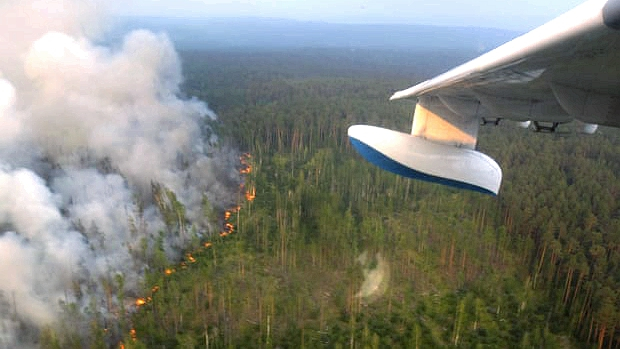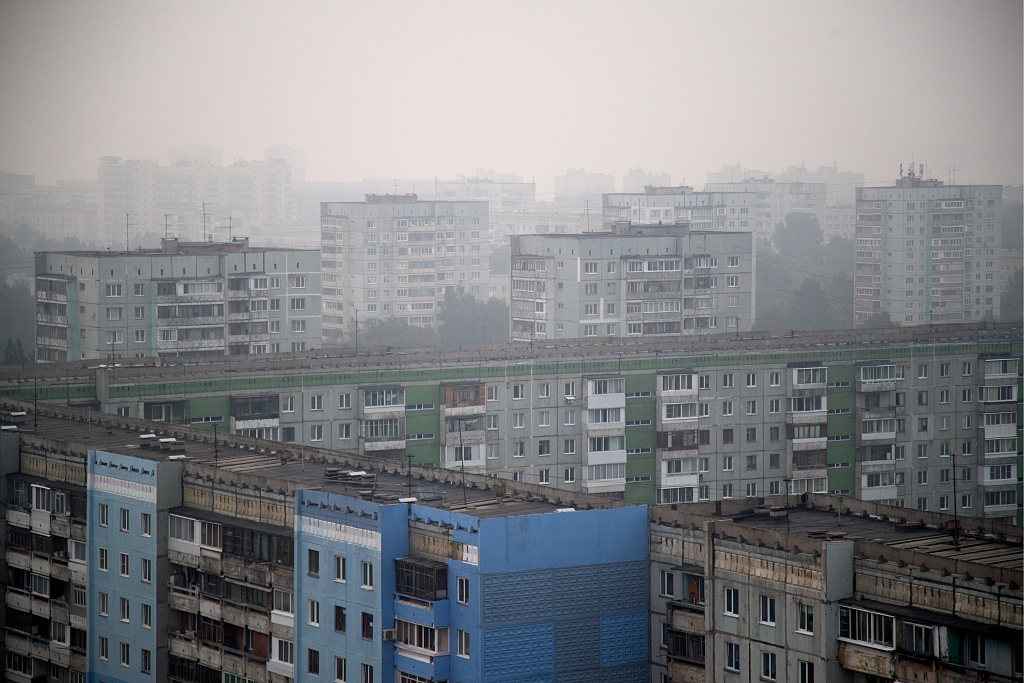

A jet prepares to pour water onto a forest fire in Krasnoyarsk, Russia. /AP Photo
Russian President Vladimir Putin ordered the Russian Defense Ministry to dispatch 10 aircraft and 10 helicopters to combat wildfires raging in several remote regions of Siberia, enveloping entire cities in black smoke.
The President's order includes sending military transport planes and helicopters equipped with a water-release system to fight the fires. Wildfires in Russia have already spread to around three million hectares of mostly remote forest, an area almost the size of Belgium.
U.S. President Donald Trump offered help in extinguishing wildfires in Siberia in a telephone conversation with Russian President Vladimir Putin held on Wednesday evening. Putin expressed sincere gratitude to Trump "for such attentive attitude, for offering help and support." He also noted that Russia will accept the offer if needed.
"The Russian president appreciated this step by the U.S. president as a signal that the two countries will manage to restore full-format relations in the future," the Kremlin press service said.

This image made from video provided by RU-RTR Russian television channel shows a view of a forest fire in the Boguchansky district of the Krasnoyarsk region, Russia Far East, July 31, 2019. /via AP
Russian authorities have declared a state of emergency in five areas, including all of the Irkutsk and Krasnoyarsk regions, which lie north of Mongolia. Siberia’s Krasnoyarsk region, which stretches all the way to the Kara Sea and the Arctic Ocean, can be seen blanketed in smoke by satellite photos from NASA and Europe’s Copernicus Atmosphere Monitoring Service (CAMS).
Environmentalists have warned that the scale of the blazes could accelerate global warming, aside from any immediate effects on the health of inhabitants.
Russia's agency for aerial forest protection, Avialesookhrana, said about 2,700 firefighters were working to put out the blazes but it said about 28,000 square kilometers of the fires were in difficult-to-reach areas. Those forest fires, it said, were not being fought because the costs and risks of doing so were higher than the potential damages the fires could cause to unpopulated areas.
No injuries or evacuations have been reported so far from the fires, many of which appear to have been started by lightning strikes in "dry thunderstorms” in which precipitation disperses before reaching the ground.
But the fires, which were being spread by strong winds, have produced heavy smoke has clogged the air in several cities, including Novosibirsk, Russia's third-largest city with a population of 1.6 million in southwestern Siberia.

Smoke from the Siberia forest fires is wafting in the city of Kemerovo, July 25, 2019. /VCG Photo
Prime Minister Dmitry Medvedev visited the city of Krasnoyarsk on Wednesday and gave a glum assessment of the forest fires.
"The situation is difficult. Many forests are burning, smog and smoke are observed over many populated areas. The prognosis at this moment is not happy," he said.
Russia's vast stretches of forest have often been hit by widespread fires in the summer months. This year, however, the world experienced the warmest June on record.
"It's not for the first time that we're having this catastrophe in our country," said Mikhail Kreindlin, a Greenpeace activist in Moscow. "Why there is so much attention to it this year is because the smoke from the fires has reached the cities, with activists who (have) started to raise the issue."
Protests demanding action against the heavy smoke from the fires were planned for Thursday in Moscow outside the Ecology Ministry. Greenpeace also planned to submit a petition with more than 200,000 signatures to the Russian government urging a better response to wildfires and more preventive action.
(With input from AP)

Copyright © 2018 CGTN. Beijing ICP prepared NO.16065310-3
Copyright © 2018 CGTN. Beijing ICP prepared NO.16065310-3